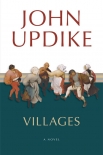Villages, John Updike [brene brown rising strong .TXT] 📗

- Author: John Updike
Book online «Villages, John Updike [brene brown rising strong .TXT] 📗». Author John Updike
In the red Stingray going home, Owen dared tell her, “I’m not sure Alissa was quite ready for you to grab her baby like that.”
“She loved it,” Phyllis said. “All women want to have their babies admired. Alissa would have been hurt if we hadn’t begged her to hold it. Her.”
“I missed the begging part. Uh—I assume you were joking about another child. Eve is going to be seven, and she’s been the baby all her life. You don’t want to go back to diapers and being up at night and all that, do you?”
“Only if it will bring us closer together.”
“How could we be closer? My God, we’re practically welded together.”
She didn’t speak for a moment, then said, “Of course I was joking, Owen. You must be crazy, to think I’d have another baby with you.”
This was more absolute than he wanted—on the opposite end of the curve from her betranced party deportment. The real Phyllis was becoming harder and harder for him to locate. He offered, less able than she to tolerate silence in the car, “I thought with Eve off most of the day you could go back somewhere, maybe to Trinity or even Yale, for a course or two. Some kind of refresher, to get you back into your Ph.D. thesis.”
“Or I could go back to the ballet lessons I dropped when I was eleven,” she said, so serenely he didn’t realize for some seconds that she was being ironical.
In Haskells Crossing, in the twenty-first century, Easter shows the rich to good advantage. They attend church then, and at Christmas, if never else, as if keeping up the supernatural contract by which they have prospered. The Episcopal is the church of choice, three and a half centuries after the Puritans established their iron theocratic rule. They were fanatics; the United States is a conservative country built upon radicalism. The white wooden Congregational church in many a New England town has grown seedy—the paint peeling, the steeple nearly toppling with dry rot, the bulletin board outside advertising sermons with jocular sermon titles like I’M O.K., GOD’S O.K., or FORBIDDEN FRUITS CREATE MANY JAMS—compared with the sharply gabled, half-timbered structures devoted to Cranmer’s graceful words and Henry the Eighth’s regal whim.
Owen, though himself rich enough, thanks to the split-up and sale of E-O Data in the ’seventies, viewed the rich, the hereditary rich, as an exotic tribe. He believed that the mill-owning wealth of Alton had oppressed his father and had defrauded his grandfather. Certain local textile fortunes had had, in Willow, the mythic resonance of the Mellons, Fricks, and Carnegies in Pittsburgh. But, though he strained to see over the spiky sandstone wall of the Pomeroy estate near Cedar Top, and overheard the distant splashing of a swimming pool, he had never encountered any of these fabulous creatures. At the Scheherazade—a windowless, slant-floored hall, with a siding of tin sheets stamped to resemble bricks, an interior decorated by a few Chinese lamps and Art Deco stripes, an outside ticket booth containing the owner’s gray-haired wife, and a marquee whose lights attracted masses of moths in the summer—the rich, played by Cary Grant and Fred Astaire, Joan Blondell and Katharine Hepburn, Charles Coburn and Eugene Pallette, were projected in an affectionate silvery light, as stars in a comedy of misunderstanding eventually remedied by sexual attraction and a limitless reserve of lightly taxed money. What a triumph of capitalist art that was, deflecting the poor from hatred of the rich into a chuckling pity for them! With a flick of changed fortune, the poor might be rich themselves, as foolish and happy. For the moguls manufacturing these films it was, of course, no fantasy. They had made it in America. So, in a lesser way, had Owen.
Now he can see in three dimensions and natural color, at the ten o’clock Easter service at Haskells Crossing’s Saint Barnabas, the Wainthrop clan, taking up two front pews. The eighty-year-old matriarch, long a widow, is enthroned in a wheelchair that blocks half the aisle; congregants going up to the rail for communion step around it. Before the service begins, one by one her grandsons, each clad in a blazer and rep tie and button-down broadcloth shirt, lean or squeeze past their elders to do this eldest, in her rigid blue hair and black straw sunhat, honor with a kiss smuggled sideways under the hat’s broad rim. Not a pasha or Mafia don could more grandly receive dutiful homage. Owen pictures all the money stoppered by the octogenarian’s living body, like tons of wheat waiting to pour forth from a prairie grain elevator’s unloading chute. In the meantime, enough trickles through: the boys in their blazers sport the honey tans of winter vacations spent in the Bahamas and weekends spent skiing, and the girls, even those at the awkward age, with braces and acne, display costly dresses and animating hopes of good schools and a fair value on the marriage market. Wealth is health.
Their parents, the middle generation, sit through the readings, the prayers of the people, and the sermon (Yes, He is risen, as He rises up in our lives, on many a personal Easter!) with the polite, slightly smiling expressions they bring to the myriad board meetings and bibulous social gatherings that maintain their membership in the network of the profitably engaged. Owen especially admires two peculiar traits of the male rich: their ability to grow more and more polite as the object of their courtesy becomes more and more annoying, and their ability to wear shoes, not just moccasins but loafers of fine leather, without socks. Owen, of humbler origins, is unable to conceal annoyance





Comments (0)